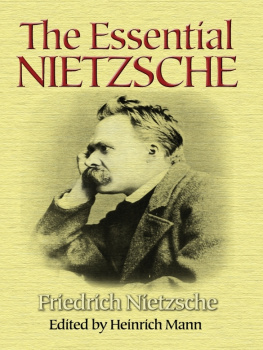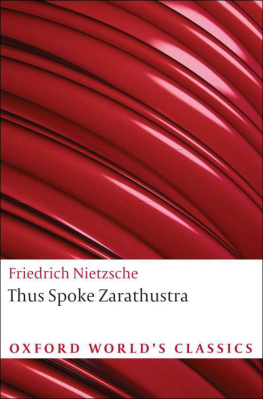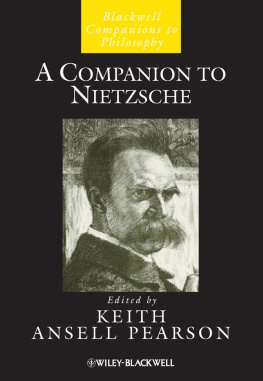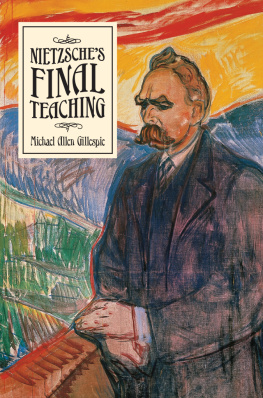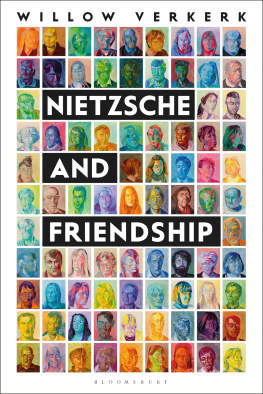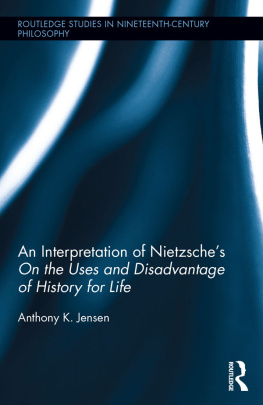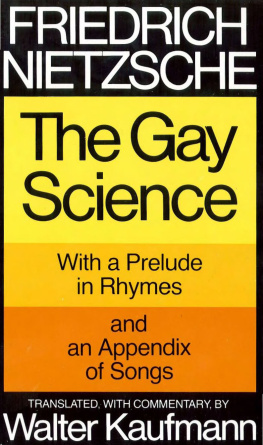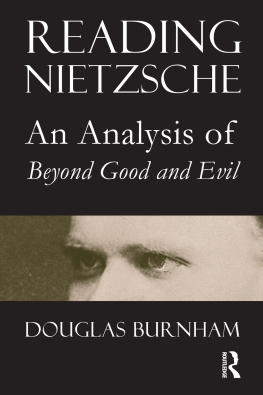
NIETZSCHES LIFE SENTENCE
NIETZSCHES LIFE SENTENCE
Coming to Terms with Eternal Recurrence
LAWRENCE J. HATAB

Published in 2005 by
Routledge
Taylor & Francis Group
270 Madison Avenue
New York, NY 10016
Published in Great Britain by
Routledge
Taylor & Francis Group
2 Park Square
Milton Park, Abingdon
Oxon OX14 4RN
2005 by Taylor & Francis Group, LLC
Routledge is an imprint of Taylor & Francis Group
Transferred to Digital Printing 2005
10 9 8 7 6 5 4 3 2 1
International Standard Book Number-10: 0-415-96758-9 (Hardcover) 0-415-96759-7 (Softcover)
International Standard Book Number-13: 978-0-415-96758-7 (Hardcover) 978-0-415-96759-4 (Softcover)
No part of this book may be reprinted, reproduced, transmitted, or utilized in any form by any electronic, mechanical, or other means, now known or hereafter invented, including photocopying, microfilming, and recording, or in any information storage or retrieval system, without written permission from the publishers.
Trademark Notice: Product or corporate names may be trademarks or registered trademarks, and are used only for identification and explanation without intent to infringe.
Library of Congress Cataloging-in-Publication Data
Catalog record is available from the Library of Congress

Visit the Taylor & Francis Web site at http://www.taylorandfrancis.com
and the Routledge Web site at http://www.routledge-ny.com
To the memory of my friend, Tod Clonan,
who danced the night away.
Contents
Foreword
Confessions of a Lifer:
Thus Spoke Hatab
DANIEL CONWAY
When Dr. Heinrich von Stein once complained very honestly that he didnt understand a word of my Zarathustra, I told him that this was perfectly in order: having understood six sentences from itthat is, to have really experienced themwould raise one to a higher level of existence than modern men could attain.
Friedrich Nietzsche, Ecce Homo
Why Nietzsche was so Anxious
Nietzsche occasionally despaired of attracting readers whom he deemed worthy of his books. His insights were so exacting, his inspiration so overpowering, his truths so explosive, that mere mortals could hardly help but miscarry them. In typical fashion, of course, he also raised to dizzying heights the stakes of readership. His Zarathustra, he modestly opined, is the greatest present that has ever been made to [humankind] so far (EH P, 4)Promethean fire, presumably, was a close second; The Antichrist is the most independent book ever produced (TI 9, 51); and so on. His authorial prowess was so magisterial that he helpfully devoted the longest chapter of his autobiography to a detailed explanation of why he wrote such good books (EH III).
But the unrivaled genius of Nietzsches good books accounts for only half of what he took to be the problem of his readership. It was also his fate to toil in an epoch that was stunningly unprepared to receive his effluent wisdom. In his estimation, his first generation of readers was as ridiculous as his books were sublime. The hands into which he was obliged to place his precious teachings would no doubt fumble them, twisting them into cheap platitudes and, even worse, trendy ideological slogans. As he neared the end of his productive career, he grew increasingly fearful that he would be mistaken for his opposite, regarded as yet another moralist or improver of mankind (EH P, 2). Alarmed that he might someday be hailed as a holy man, even as the founder of a religion, he launched a noteworthy preemptive strike: [I would] sooner even [be] a buffoon.Perhaps I am a buffoon (EH IV, 1).
One need not leave ones armchair to venture an amateur diagnosis of such anxieties. Nietzsche feared being pronounced holy precisely because he (believed he) knew the desperate condition of the likely readers of his books. He was too keen an observer of his times to bequeath his writings without reservation to the indiscriminate and redemption-minded readers of late European modernity. (He stubbornly persisted in writing in German, after all, despite claiming to loathe the Germans as a people dispossessed of their formerly formidable philosophical spirit.) He must have been tempted, like Moses, to destroy his tablets rather than place them into such unworthy, idolatrous hands.
But Nietzsche also knew that there was something of the holy man in him. He was, admittedly, a child of his time (CW P), which means that he too shared in the diffuse, post-theistic religiosity that clouded his unhappy epoch. He also knew, or at least suspected, that his residual religiosity would very likely complicate the dissemination of his more radical teachings. He knew, that is, that he would need to cultivate a new breed of strong readers, philological warriors who could endure his occasional lapses into religiosity while continuing, undistracted, to receive from him the teachings he was poised to dispense. Such readers surely awaited him in the postmoral future that he so vividly imagined. But what of his present, the twilight epoch of late modernity? Were such readers likely to be found in an age that he had expertly diagnosed as irrecuperably decadent?
Although he claimed among his contemporary readers nothing but first-rate intellects and proven characters, trained in high positions and duties (EH III, 2), this boast is difficult to square with his more typical expressions of contempt for his late modern contemporaries. If such worthies were actually scattered throughout Europe and North America, posted in offices of influence, then his prospects for readership were not nearly so bleak as he preferred to insist. In that event, in fact, he would have been obliged to revisit, and perhaps even to retract, the sweeping jeremiad that he had pronounced on the whole of late modernity.
Nietzsches post-Zarathustran writings thus stage a full-blown psychological drama: Should he trust his supposedly feeble readers to receive his untimely teachings, guard them from vulgar distortion, and deliver them intact to the rightful audiences of a distant posterity? If so, then how light (or strong) a touch should he apply in his repeated efforts to instruct his readers in the art of appreciating his Dionysian wisdom? Or should he simply trust no one, strategically encrypting his teachings so that only the most Thesean of his readers will penetrate to, and return from, the center of his labyrinthine thought? Is it preferable to be read poorly by many, on the remote chance that someday some wayward disciple will inadvertently bequeath these teachings to those readers for whom they are intended? Or to be read well by so few that his chances of surviving the long entracte of late modernity are virtually nil?
Such excruciating self-interrogations eventually took the measure of Nietzsches sanity. Early in 1889, following an explosively productive year of writing and plotting, he fell without return into madnessthe result, as legend has it, of inserting himself between a besieged horse and its whip-wielding master. Notes and letters scribbled in early 1889 suggest that in madness he attained the crystalline certainty that his sanity would not abide. As the shroud of madness descended, he presented himself as a resolute lawgiver, as sheltering within his elastic soul every name in history, and as promising bold political actionincluding several high-profile assassinationsas favors to his dearest friends.
Next page

